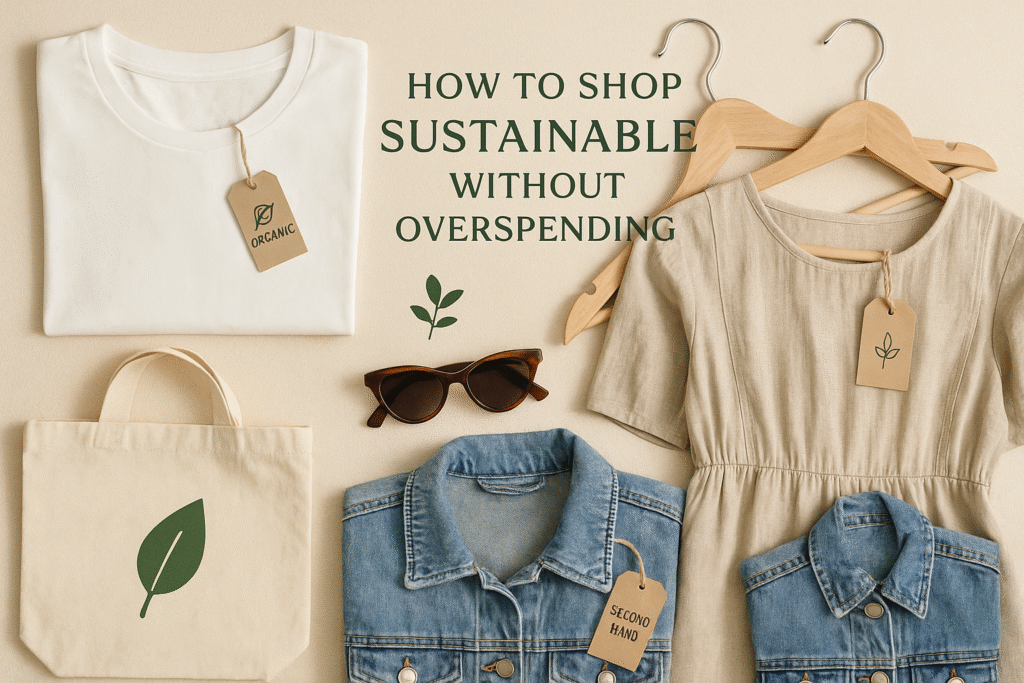Introduction
Sustainable fashion is no longer a luxury or a trend—it’s a mindset.
But let’s be honest: when you first explore eco-friendly brands, the price tags can feel intimidating. Many people believe that going green automatically means spending more.
Good news: You can shop sustainably without overspending.
In fact, sustainable shopping can often save you money in the long run.
This guide shares practical, realistic, and budget-friendly ways to embrace sustainable shopping in 2025—without hurting your wallet.
Why Sustainable Shopping Isn’t Always Expensive
A big misconception is that “sustainable = expensive.”
That’s not the whole truth. Sustainable fashion includes many options:
- thrift
- secondhand
- upcycling
- swapping
- renting
- buying fewer but better pieces
These options can be cheap or even free.
Plus, fast fashion costs add up:
- clothes that fade fast
- shoes that break
- trends that expire in weeks
Sustainable shopping focuses on long-term, high-value choices—meaning fewer purchases and less waste.
Tip 1: Start With What You Already Have
The most sustainable wardrobe is the one you already own.
Before shopping, try this:
✔ Reorganize your wardrobe
You’ll rediscover clothes you forgot you had.
✔ Repair or tailor old clothes
A simple stitch, button, or hem can give old pieces new life.
✔ Mix and match
New outfit combinations often eliminate the need to buy more.
✔ Upcycle
Turn oversized shirts into crop tops, jeans into shorts, scarves into hair accessories.
This step costs nothing—and it’s the foundation of sustainable fashion.
Tip 2: Buy Less, Choose Better
Classic sustainable rule:
Buy fewer pieces, but higher quality.
This doesn’t mean expensive. It means:
- durable materials
- simple designs
- neutral colors
- timeless silhouettes
A good-quality black tee or denim jacket lasts years longer than a trendy fast-fashion version.
✔ Example:
Cheap tee: lasts 6 months → replaced 5 times
Sustainable tee: lasts 2–3 years → cheaper long-term
Less clutter. Less waste. More savings.
Tip 3: Shop Secondhand & Thrift Stores
Thrifting is the best budget-friendly sustainable hack.
Where to look:
- Thrift stores
- Consignment shops
- Local flea markets
- Vintage stores
- Instagram thrift pages
- Facebook marketplace
- Poshmark
- Depop
- ThredUp
- Vinted
Benefits:
✔ affordable
✔ unique pieces
✔ reduces textile waste
✔ fun treasure-hunt shopping
You’ll find:
- denim jackets
- coats
- blazers
- dresses
- bags
- accessories
…for 70–80% less than retail.
Tip 4: Try Clothing Swaps with Friends
Organize a clothes swap party.
Everyone brings items they don’t wear anymore and exchanges them.
It’s:
- free
- sustainable
- social
- fun
You refresh your wardrobe without spending a single rupee/dollar.
Tip 5: Use Rental Fashion for Special Occasions
Instead of buying outfits you’ll only wear once (weddings, parties, shoots), rent them.
Platforms offer:
- dresses
- lehengas
- tuxedos
- designer wear
- maternity photoshoot outfits
You get premium looks at 10–20% of the cost while keeping your wardrobe minimal.
Tip 6: Follow Sustainable Sales & Outlet Stores
Eco-friendly brands do run sales—especially:
- season-end
- mid-year
- Black Friday
- brand anniversaries
Follow your favorite brands on:
- newsletters
- apps
- websites
You’ll know when prices drop—and can buy sustainable pieces at affordable rates.
Tip 7: Choose Multipurpose Clothing
Multifunctional clothing helps you buy less.
Examples:
- A linen shirt that works for office, casual, and vacation
- A long cardigan used as a dress
- Neutral trousers paired with 10+ tops
- A reversible jacket
- Athleisure that doubles as casual wear
This way, each piece does more work—saving money and wardrobe space.
Tip 8: Focus on Sustainable Fabrics (Budget Options)
You don’t need expensive brands to choose sustainable materials.
Affordable eco-friendly fabrics include:
- organic cotton
- linen
- bamboo blends
- hemp
- recycled polyester
- TENCEL™ Lyocell
Look for these materials in retail stores, local shops, or marketplaces.
Tip 9: Shop Local, Not Fast Fashion
Local tailors and small businesses often use:
✔ natural fabrics
✔ handmade processes
✔ ethical labor
✔ fair pricing
You get customization, better fit, and affordable sustainable options.
Tip 10: Create a Capsule Wardrobe
A capsule wardrobe includes:
- 20–30 pieces
- mix-and-match colors
- essential basics
Benefits:
✔ saves money
✔ reduces overconsumption
✔ makes styling easier
✔ always looks clean & polished
Perfect for:
- students
- influencers
- professionals
- travelers
It’s the smartest way to be stylish sustainably.
Tip 11: Avoid Trend Buying
Trends come and go extremely fast.
Instead of copying every micro-trend:
- pick styles that suit YOU
- choose evergreen colors
- invest in classic fits
Your wardrobe lasts longer, and so does your bank balance.
Tip 12: Use Shopping Apps with Eco Filters
Many apps now offer:
- sustainability filters
- recycled materials
- ethical production labels
You get sustainable options—within your price range.
Tip 13: Track Your Spending
Keeping a simple budget reminds you:
- what you already bought
- what you actually need
- what is impulse buying
Even a note app works!
Tip 14: Avoid Impulse Purchases
Before buying something, ask:
- Do I need this?
- Do I have something similar?
- How many times will I wear it?
- Does it match at least 3 outfits?
If not—skip it.
Conclusion
Shopping sustainably doesn’t mean overspending—it means shopping smart.
By choosing long-lasting pieces, exploring thrift stores, renting outfits, supporting local creators, and avoiding impulse buys, you can build a stylish, eco-friendly wardrobe on any budget.
Sustainable fashion is not about perfection—it’s about progress.
Small changes lead to big impact.

